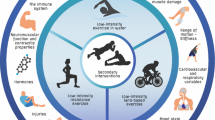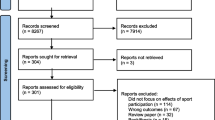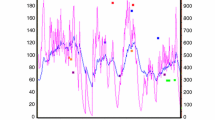Abstract
The current study extends existing sport psychology research by developing a more comprehensive athlete attitudinal survey—the Sports Performance Inventory (SPI). A multiple item survey consisting of sport-related attitudinal items was distributed to 274 students enrolled in a large Division I Midwestern university. A principal components analysis with varimax rotation performed on the original survey items resulted in an 83 item survey with six interpretable factors: Competitiveness, Team Orientation, Mental Toughness, Emotional Control, Positive Attitude, and Safety Consciousness. All subscales demonstrated adequate item discriminability and internal consistency. Important statistically significant differences between college/novice and male/female athletes were found: (1) College athletes were found to have a higher SPI composite than novice athletes; (2) College athletes were found to have a more positive attitude than novice athletes; (3) College athletes were more competitive than novice athletes; (4) Females were more team oriented than males; and (5) Novice males were more competitive than novice females, while college females were more competitive than college males. Implications of these findings and suggestions for future research are discussed.
Similar content being viewed by others
REFERENCES
Anderson, M., & Williams, J. (1988). A model of stress and athletic injury: Prediction and prevention. Journal of Sport and Exercise Physiology, 10, 294–306.
Daw, J., & Burton, D. (1994). Evaluation of a comprehensive psychological skills training program for collegiate tennis players. The Sport Psychologist, 8, 37–57.
Ford, J. K., MacCallum, R. C., & Tait, M. (1986). The application of exploratory factor analysis in applied psychology: A critical review and analysis. Personnel Psychology, 26, 461–477.
Gauvin, L., & Russell, S. (1992). Sport-specific and culturally adapted measures in sport and exercise psychology research: Issues and strategies. In R. Singer, M. Murphy, & L. Tennant (Eds.), Handbook of Research on Sport Psychology. New York: Macmillian Publishing Company.
Gill, D., & Deeter, T. (1988). Development of the sport orientation questionnaire. Research Quarterly for Exercise and Sport, 59(3), 191–202.
Kraus, J., & Conroy, C. (1984). Mortality and morbidity from injuries in sports and recreation. Annual Review of Public Health, 5, 163–192.
Martin, J., & Gill, D. (1991). The relationships among competitive orientation, sport-confidence, self-efficacy, anxiety, and performance. Journal of Sport & Exercise Psychology, 13, 149–159.
Meyers, A., Whelan, J., & Murphy, S. (1995). Cognitive behavioral strategies in athletic performance enhancement. In A. Meyers, J. Whelan, & S. Murphy (Eds.), Progress in Behavior Modification (pp. 137–164). Pacific Grove, CA: Brooks/Cole.
Smith, R., Schutz, R., Smoll, F., & Ptacek, J. (1995). Development and validation of a multidimensional measure of sport-specific psychological skills: The athletic coping skills inventory-28. Journal of Sport & Exercise Psychology, 17, 379–398.
Vealey, R. (1986). Conceptualization of sport-confidence and competitive orientation: Preliminary investigation and instrument development. Journal of Sport Psychology, 8, 221–246.
Vealey, R. (1988). Sport-confidence and competitive orientation: An addendum on scoring procedures and gender differences. Journal of Sport & Exercise Psychology, 10, 471–478.
Williams, J., & Roepke, N. (1992). Psychology of injury and injury rehabilitation. In R. Singer, M. Murphy, & L. Tennant (Eds.), Handbook of Research on Sport Psychology. New York: Macmillian Publishing Company.
Author information
Authors and Affiliations
Rights and permissions
About this article
Cite this article
Jones, J.W., Neuman, G., Altmann, R. et al. Development of the Sports Performance Inventory: A Psychological Measure of Athletic Potential. Journal of Business and Psychology 15, 491–503 (2001). https://doi.org/10.1023/A:1007878802276
Issue Date:
DOI: https://doi.org/10.1023/A:1007878802276




